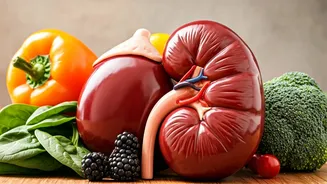Kidneys: The Basics
The kidneys play a crucial role in the human body, serving as the primary filtration system. They are responsible for removing waste products and excess
fluids from the blood, which are then eliminated through urine. Furthermore, kidneys help regulate blood pressure, produce hormones essential for red blood cell production, and maintain the body's electrolyte balance. They also help activate vitamin D, vital for bone health. Healthy kidneys are, therefore, critical for overall health and well-being. Proper kidney function ensures efficient waste removal, and proper regulation of blood pressure, blood health, and bone health.
Embrace: Beneficial Foods
Several foods can provide significant benefits in supporting kidney health. Firstly, incorporating cruciferous vegetables like cauliflower, cabbage, and broccoli into your diet is beneficial. These vegetables are rich in vitamins, minerals, and antioxidants, and also contain compounds that can help neutralize toxins. Secondly, red bell peppers are a great choice due to their low potassium content and high vitamin and antioxidant levels. They contribute essential nutrients without overworking the kidneys. Thirdly, apples, known for their high fiber content and anti-inflammatory properties, can contribute to kidney health. Apples can assist in reducing cholesterol and blood sugar levels, reducing the risk factors for kidney disease. Finally, garlic is a flavorful addition to meals, known for its anti-inflammatory properties, and beneficial for those with kidney conditions. When consumed, it reduces the risk of inflammation.
Avoid: Foods to Limit
Certain foods, on the other hand, should be consumed in moderation or avoided to safeguard kidney health. One category to be mindful of is processed foods, which often contain high levels of sodium, phosphorus, and other additives that can strain the kidneys. Limiting your intake of processed meats, canned goods, and pre-packaged snacks is advisable. Secondly, high-potassium foods such as bananas, spinach, and potatoes, should be monitored. While these are nutritious, excessive potassium can be problematic for those with kidney issues. Thirdly, foods high in sodium, like salty snacks and fast food, contribute to high blood pressure, thereby increasing the risk of kidney damage. Lastly, excessive protein intake may also stress the kidneys. While protein is crucial, overconsumption forces the kidneys to work harder to filter waste, which may lead to kidney damage over time.
Dietary Strategies Explained
Adopting a kidney-friendly diet involves making mindful food choices and making some lifestyle changes. It is crucial to stay adequately hydrated. Drinking plenty of water helps flush out toxins and supports the kidneys' filtration function. When managing your sodium intake, carefully checking food labels to monitor sodium levels is crucial. Consider cooking meals from scratch to better control the ingredients used and the amount of sodium added. Another key point is to practice portion control, specifically for protein-rich foods. Balancing your diet with adequate protein intake is important. Finally, consulting with a healthcare provider or a registered dietitian for personalized advice is recommended. They can help create a customized dietary plan to meet individual needs and health conditions.



















